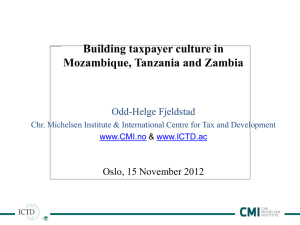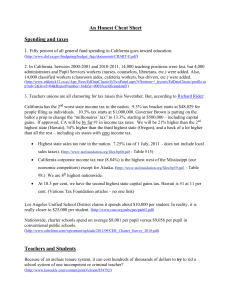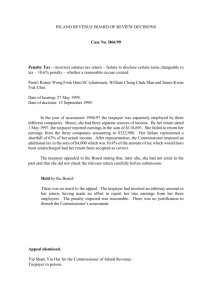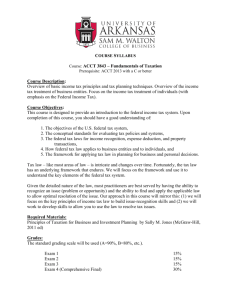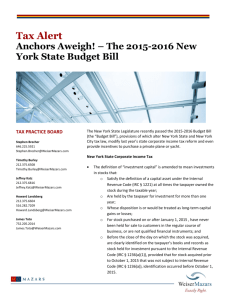Document
advertisement
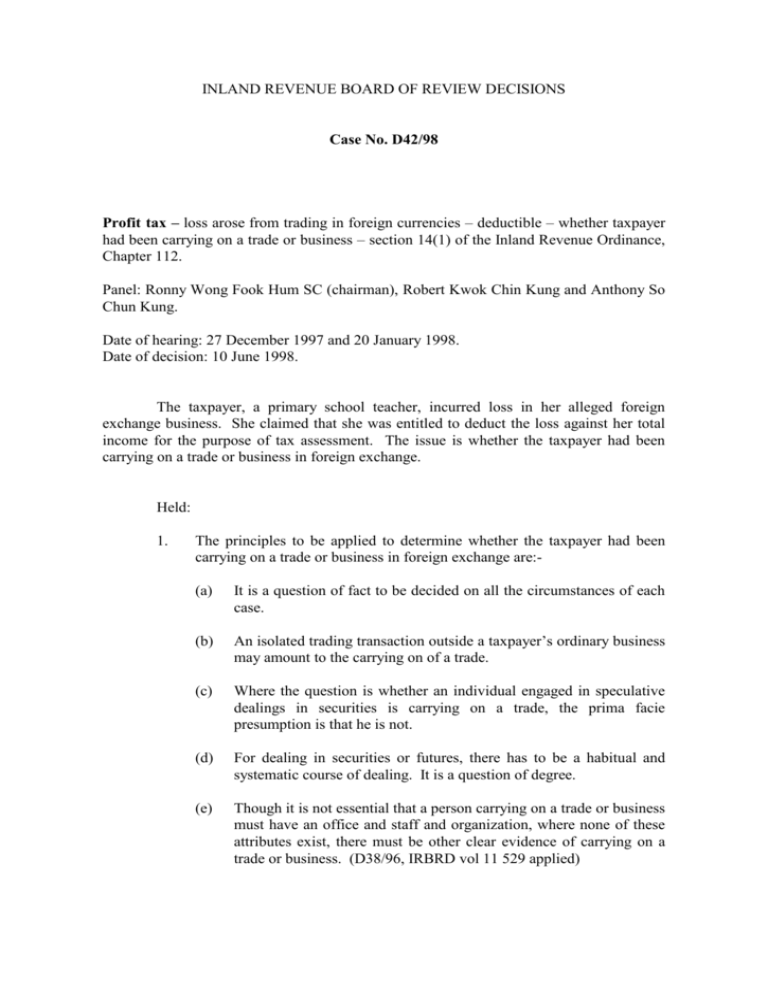
INLAND REVENUE BOARD OF REVIEW DECISIONS Case No. D42/98 Profit tax – loss arose from trading in foreign currencies – deductible – whether taxpayer had been carrying on a trade or business – section 14(1) of the Inland Revenue Ordinance, Chapter 112. Panel: Ronny Wong Fook Hum SC (chairman), Robert Kwok Chin Kung and Anthony So Chun Kung. Date of hearing: 27 December 1997 and 20 January 1998. Date of decision: 10 June 1998. The taxpayer, a primary school teacher, incurred loss in her alleged foreign exchange business. She claimed that she was entitled to deduct the loss against her total income for the purpose of tax assessment. The issue is whether the taxpayer had been carrying on a trade or business in foreign exchange. Held: 1. The principles to be applied to determine whether the taxpayer had been carrying on a trade or business in foreign exchange are:(a) It is a question of fact to be decided on all the circumstances of each case. (b) An isolated trading transaction outside a taxpayer’s ordinary business may amount to the carrying on of a trade. (c) Where the question is whether an individual engaged in speculative dealings in securities is carrying on a trade, the prima facie presumption is that he is not. (d) For dealing in securities or futures, there has to be a habitual and systematic course of dealing. It is a question of degree. (e) Though it is not essential that a person carrying on a trade or business must have an office and staff and organization, where none of these attributes exist, there must be other clear evidence of carrying on a trade or business. (D38/96, IRBRD vol 11 529 applied) INLAND REVENUE BOARD OF REVIEW DECISIONS 2. Further, the Board has to consider the pattern of dealing by the taxpayer to see whether she had embarked upon a habitual and systematic course of dealing. 3. Having taken into consideration:(a) there was no element of system or organization in the running of the foreign exchange trade or business; (b) the taxpayer did not spent much time studying or learning about the exchange market; (c) the taxpayer subscribed to no professional services and had no particular source of information’ (d) the taxpayer did not adopt any specific method or combination of trading positions that could ensure for her benefits; and (e) the taxpayer’s dealings were not transacted according to any plan but simply on the basis of her speculative instincts: The Board came to a conclusion that the taxpayer had not embarked on a business or dealing in foreign exchange. Appeal dismissed. Case referred to: D38/96, IRBRD, vol 11, 529 Wong Ki Fong for the Commissioner of Inland Revenue. Taxpayer in person. Decision: The Appeal 1. By a notice of original assessment and demand for tax for the year of assessment 1991/92, the Taxpayer was assessed on the basis that her total income for that year amounted to $580,238 made up as follows: a. Rental income: $73,400. INLAND REVENUE BOARD OF REVIEW DECISIONS b. Salaries as a school teacher: $227,567 and c. Business profits from property transactions: $279,271. 2. By a profit tax return dated 26 October 1995, the Taxpayer reported to the Revenue a loss of $389,892 said to have arisen from her trading in foreign currencies in the name of A at District B [‘Address 1’]. That business was said to have been commenced on 10 June 1991 and terminated on 9 December 1991. 3. In support of her contention, the Taxpayer produced transaction statements issued by Company C, an investment company to her at District D [‘Address 2’] for the period between 10 June 1991 to 9 December 1991. 4. By letter dated 8 April 1997, the Taxpayer further claimed that the loss she sustained in her foreign currencies business amounted to $792,700 as opposed to $389,892. 5. The issue before us is whether the Taxpayer is entitled to deduct the loss that she claims as arising from her alleged foreign exchange business against her total income from the three sources referred to in paragraph 1 above. The sworn evidence of the Taxpayer 6. She was a primary school teacher in 1991. She had no experience working in any foreign exchange business. 7. She had no formal training in foreign exchange. Her knowledge in that area was derived from her reading of the newspapers. 8. All her foreign exchange business was transacted through margin facilities extended by Company C. 9. She did not register her foreign exchange business. She had no office, no staff and no equipment in support of that business. 10. She did not have any business strategy. She made her decisions in the light of recommendations in newspaper and advice from brokers. 11. She also carried on a business of property dealings in the same period. She bought and sold properties in various districts. She did not register her property dealing business nor was she assisted in the course of that business. The applicable principles INLAND REVENUE BOARD OF REVIEW DECISIONS 12. The relevant statutory provision is section 14(1) of the Inland Revenue Ordinance [‘the IRO’]. The issue is whether the Taxpayer had been carrying on a trade or business in foreign exchange. 13. Our attention has been drawn to various decisions which set out the applicable principles in this type of case. Those principles have been succinctly summarised in the decision of this Board in D38/96, IRBRD, vol 11, 529 as follows: a. It is a question of fact to be decided on all the circumstances of each case. b. An isolated trading transaction outside a taxpayer’s ordinary business may amount to the carrying on of a trade. c. Where the question is whether an individual engaged in speculative dealings in securities is carrying on a trade, the prima facie presumption is that he is not. d. For dealing in securities or futures, there has to be a habitual and systematic course of dealing. It is a question of degree. e. Though it is not essential that a person carrying on a trade or business must have an office and staff and organisation, where none of these attributes exist, there must be other clear evidence of carrying on a trade or business. Our decision 14. The Taxpayer argued that no distinction can be drawn between her business of property dealings and her business of dealing in foreign exchange. She did not register either business. She had no office or staff for both. The Revenue however contended that the subject matters of both types of businesses are different. Foreign exchange is much more speculative and requires little finance. 15. We are of the view that the issue is essentially one of degree. We have to consider the pattern of dealing by the Taxpayer to see whether she had embarked upon a habitual and systematic course of dealing. 16. The Taxpayer’s dealings had been helpfully summarised in various schedules prepared on behalf of the Commissioner. In relation to the Taxpayer’s ‘open positions’, there were: 17. a. 33 transactions in June in the course of 10 trading days. All those ‘open positions’ were liquidated in the same month. b. 15 transactions in July in the course of 10 trading days. All those ‘open positions’ were also liquidated in the same month. INLAND REVENUE BOARD OF REVIEW DECISIONS c. 2 transactions in August in the course of 2 trading days. Those ‘open positions’ were liquidated in the same month. d. 6 transactions in September in the course of 4 trading days. Those ‘open positions’ were liquidated in September, November and December. The liquidations in December accounted for $285,264.57 of the total loss of $384,274.73 for the period between June to December 1991. e. 1 transaction in October liquidated in November. f. 1 transaction in November liquidated in the same month. Most of the transactions took place within the first two months when the Taxpayer was trying out her footing. The number of transactions then dropped. The pattern does not appear to us to be habitual. 18. There is also no element of system or organisation. The Taxpayer, on the evidence before us, did not spend much time studying or learning about the exchange market. She subscribed to no professional services and had no particular source of information. She did not adopt any specific method or combination of trading positions that could ensure for her benefits. Her dealings were not transacted according to any plan but simply on the basis of her speculative instincts. 19. For these reasons, we have come to the conclusion, albeit with reluctance, that there is no clear indication that the Taxpayer had embarked on a business or dealing in foreign exchange. We dismiss the Taxpayer’s appeal. 20. We regret the delay in producing this decision. The matter was of some concern to us.


